March 28, 2022 | Alumni
When sport and journalism collide: Q & A with CTV journalist Annie Bergeron-Oliver
By Jelena Damjanovic
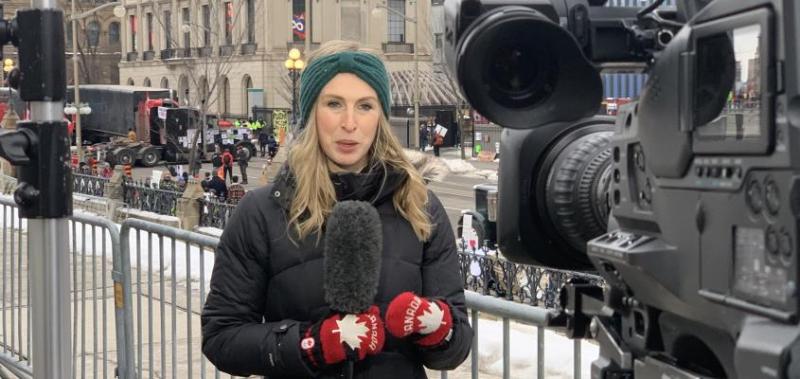
U of T alum and CTV journalist Annie Bergeron-Oliver doing a live hit from Parliament Hill in Ottawa during the trucker protests (photo courtesy of Annie Bergeron-Oliver)
On the surface, there is not much in common between journalism and sport, but dig a little deeper and you may find the same skills can come in handy. Annie Bergeron-Oliver (BPEH 2011) graduated with a bachelor in physical education and health from the University of Toronto, before earning a master’s degree in journalism from Columbia University and becoming a CTV journalist. The Faculty of Kinesiology & Physical Education caught up with her recently to chat about her unconventional career path.
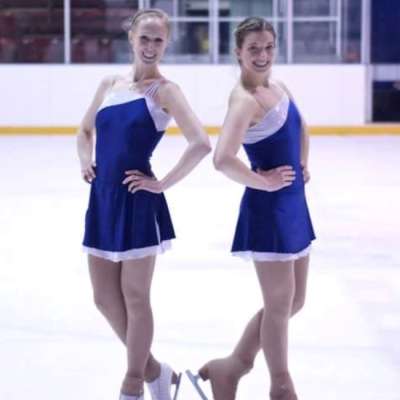
You were a successful figure skater and competed at the national level. Is that what led you to pursue an undergraduate degree in physical education and health (BPEH) at the University of Toronto?
My mom was a coach so I’ve been figure skating all my life, since I was about two or three. In fact, I barely spent any time in high school, as I was travelling for skating all around Canada. One of my skating coaches at the time was based in Richmond Hill, so when I was looking for universities, it was really important for me that I find some place that would allow me to still skate full time and be relatively close to my coach. In my first year of university, I was still competing full time at the provincial and national level.
What interested me about the BPEH program was that it gave me an opportunity to still be involved in sports, while offering such an interesting array of classes that were related to sport in different capacities. It was a great fit.
What was it like balancing your academic classes with your skating responsibilities?
It wasn’t easy. In first year, I took a full course load and I skated every day, so I would get up at six in the morning, take the bus to Cricket Club, skate for two hours, then go to classes all day. Three times a week, I would skip all my afternoon classes and take the TTC from downtown Toronto to Richmond Hill to see my coach, skate there for three to four hours, then travel back downtown on the TTC for two hours. And, I was also part of the Varsity Blues figure skating team. So, my first two years at university were very, very busy.
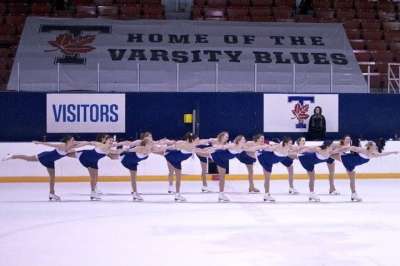
What lessons did you learn in the BPEH and Varsity Blues that you use in your life as a journalist today?
One of the things that I got out of the program is a really good ability to manage my time. The other thing was motivation. When you are surrounded by classmates who are also somehow managing to be Olympians or Ontario University Athletes (OUA) or University Sports (U Sports) champions, you can’t help but be inspired. I learned to work really hard and balance things despite the high levels of stress and sometimes even anxiety over classes and exams. U of T always had high standards. You saw your classmates do well, so you wanted to do well also.
In my job as a journalist, I have to balance a thousand different things on really tight deadlines, so having that practice in university really did help.
I have to balance a thousand different things on really tight deadlines, so having that practice in university really did help
How did you pivot from a degree in BPEH to journalism? What drew you to journalism?
What I wanted to do in university was find a program that I would be interested in and sport has always been a constant in my life. So, the BPEH program at U of T was an easy fit because I liked the courses that I was studying. Learning about sport nutrition, for example, was something that helped me in my real life, in my skating career. Learning how to be a better athlete and how to teach athletes better helped me in my coaching career.
But, I was missing politics. Growing up in Ottawa you can’t help but be interested in politics. I started taking a couple of courses in the department of political science and then I started writing for The Varsity newspaper. By the end of my fourth year, I realized that I didn’t want to be a sport psychologist or a physiotherapist, as I had initially planned and instead I was interested in journalism, which is a career my mom and dad and brother all do. I applied to Columbia and that’s how I ended up in journalism.
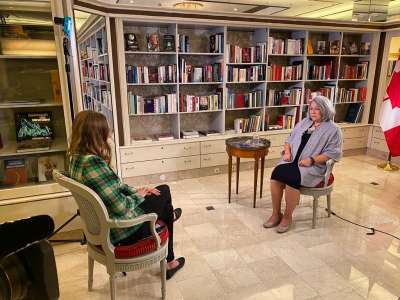
What was that like?
Living in NYC for a year was amazing. Columbia University is at the heart of NYC where so many news networks are based, so it was a great learning experience.
And you continued the family tradition?
Journalism was something I knew, it was a career that I understood really well, but my parents actually discouraged me from pursuing it when I was young. They recommended I try something I was interested in, like science or phys.ed. and if at the end of four years I still wanted to go into journalism, to do it as a master’s.
So, I thought maybe I’ll do sports journalism. I worked at Sports Illustrated for a while and I was fascinated by the work they do, but it wasn’t quite what I was looking for. Then I thought maybe I could work for TSN, cover figure skating for them or do sport documentaries, but eventually I ended up back in Ottawa covering politics, which I find fascinating and exciting.
You’ve been part of the CTV Parliamentary Bureau since 2018. Have you ever covered anything similar to the recent protests in Ottawa? How was this experience different?
I’ve been to a lot of different countries and covered a lot of protests. What was so different about this was the fact that you were sort of living it every single day. I live in the downtown core in Ottawa, so I would come home and I could still hear the horns blaring in the evening. This went on for so long, it was only after it was all over that I realized how stressed I really was.
The other hard part was that we were constantly being harassed or yelled at. As a TV reporter, you have cameras, so we were easy to spot. A lot of people would get angry with us, say that we are fake news and weren’t telling the story truthfully and that we should go down and talk to people.
I’ve covered a lot of protests. What was so different about this [one] was the fact that you were living it every single day
As a reporter you want to tell both sides of the story, you want to talk to people, but it was hard to do. There were some conversations that I had that were enlightening and intelligent and kind, but a lot of the conversations I had were people yelling and swearing at me, telling me I was the devil. It was very challenging, but also a learning experience.
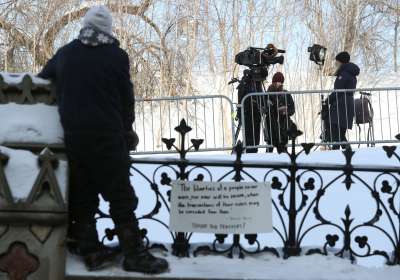
Did your background in sports come in handy at any point?
Probably more than I thought at the time. In sports and especially as a competitive athlete, you are trained to zero in, focus on your job and ignore all the external noise. In skating, when you step on the ice, you have to ignore everything that’s around you, ignore all the noise and just try to do your job. So, I tried to channel that every day and also forget about any negative experience from the day before. In skating, you have to do two routines on two different days. If you fall on one element, you have to put that away, move forward and do the next one. If you don’t, you’re never going to be able to compete.
Do you have a message for current students at the Faculty of Kinesiology and Physical Education (KPE) mulling over career options?
A lot of people come into the program thinking they’re going to become a doctor or a physiotherapist or researcher, but there are a lot of people who expand beyond those typical careers. In my class, we have somebody who is now a lawyer, someone else became a nurse … What it really comes down to is taking what you learned in the last few years and finding what really interests you out of that. As long as you’re interested in what you’re doing, then ultimately you’ll be successful.
As long as you’re interested in what you’re doing, then ultimately you’ll be successfulYour undergraduate degree in kinesiology sets you up with a foundation that will help you succeed in any career. It gives you time management skills and the ability to absorb a lot of information very quickly. A lot of the leadership training courses I took at KPE really helped me be a better leader and communicate with people differently - those are all skills that are very transferable.
Originally published by the Faculty of Kinesiology & Physical Education

